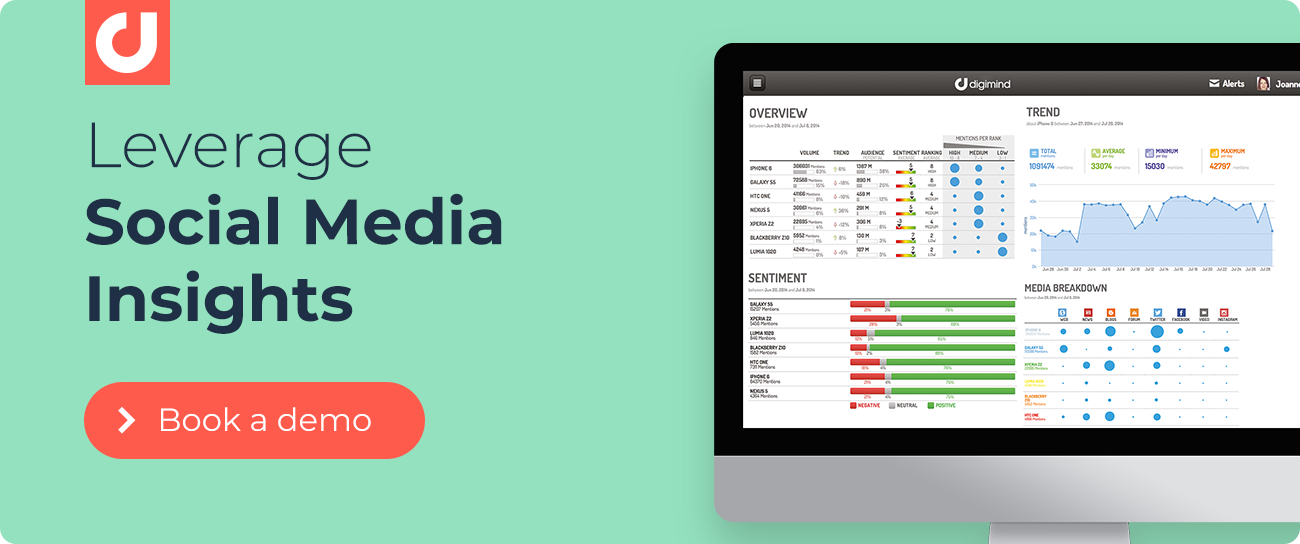5 Indisputable Reasons For Companies To Invest In Social Listening
Social media advertising budgets worldwide have doubled, which has also increased the pressure on digital marketers to deliver ROI from their activities. At the same time, with 3.196 billion active social media users in the world, and a further 4.021 billion internet users globally, the Internet is brimming with consumer insights and market trends, waiting to be discovered.
Nonetheless one question we still hear from clients is: why should I invest in a dedicated social media listening tool when I can get information from Google, reports from other companies, and in-built functions on social media networks?
Depending on your team’s objectives, social media monitoring tools can be beneficial in numerous ways. Having an understanding of the value and benefits these tools are able to provide can help companies decide how value-adding they will be to their organisation.
Here are the top five benefits of using in a dedicated social media listening tool, and common reasons why companies choose to invest in them.
1. Real-Time Customer Insights
One minute zombies and vampires are in, the next mermaids and unicorns are. Technology has resulted in consumer behaviours, trends and preferences changing faster than ever. Monitoring your brand and target audience on social media allows you to ensure your content marketing strategy stays relevant and engaging for consumers by keeping up with changing trends in real-time.
By monitoring keywords related to your industry, you can also discover consumer conversations about common pain-points, and what they like, dislike and would like to have in their products. Such information can be used to prioritize product development strategies and develop marketing campaigns to highlight existing features unknown to consumers.
See how asus used insights from social listening to develop and market the ZenFone Zoom S.
2. Competitive Benchmarking
How do people perceive you in relation to your competitors? How is your company performing according to industry benchmarks? Social listening and analytics allows you to acquire knowledge not just about your company but competitors too. In addition to understanding where your brand stands in the industry, you’ll also be able to keep track of what competitors are doing to determine how to respond to new threats and opportunities in the market.
3. Identifying Influencers and Brand Advocates
According to Nielsen, 90% of consumers trust peer recommendations. Only 33% trust ads. This clearly indicates that influencers and advocates are important for brands to reach consumers effectively. Social intelligence can help paint a picture of your company’s earned media to understand who your brand advocates and key opinion leaders in your industry are.
Influencers are important to connect with as they have the ability to influence how their followers and fans perceive you. Brand advocates are consumers who already love your brand and share positive experiences about your brand. Knowing who they are, acknowledging them, and engaging them will help nurture an online community and build brand loyalty.
4. Crisis Management
The Internet allows news and information to be shared internationally at lightning speed. And it doesn’t help that more than 85% of users do not tag a brand’s handle when sharing their experiences. For PR and brand managers, it is important not to miss out on important insights by only monitoring posts that directly address your brand. Furthermore, keywords can also contain clues on how people perceive your brand during and after a crisis so you can develop an effective crisis communication plan.
5. Accurate, Centralized Data for Dashboards & Reports
Having accurate data is the foundation for making good decisions. Social listening tools can save you time and effort by ensuring online data relevant to your company is collected on one centralized platform for easy analysis. Social monitoring tools also allow you to easily and clearly visualize data and tell stories with it.
On top of that, access to management-ready dashboards and reports containing insights such as competitor activity, campaign performance or brand reputation mean that your ROI can be easily tracked and shared with colleagues.
Interested to find out more? Have a first-hand look at how social intelligence can help you get consumer insights and market trends to make better business decisions.
Written by Sophia Guan
With a background in marketing and psychology, Sophia loves to analyze and understand consumer behaviour through observations and data. After hours you’ll find her practicing yoga or baking sourdough.

